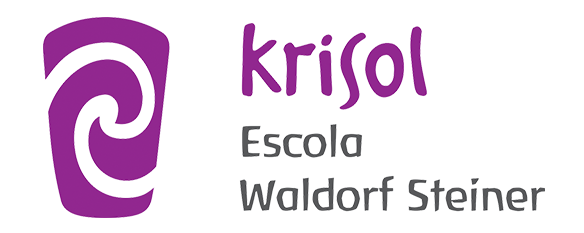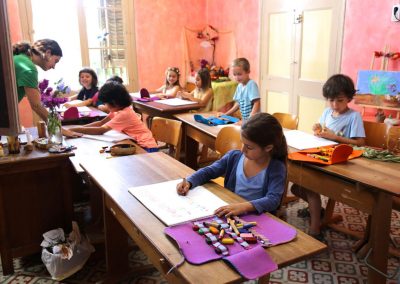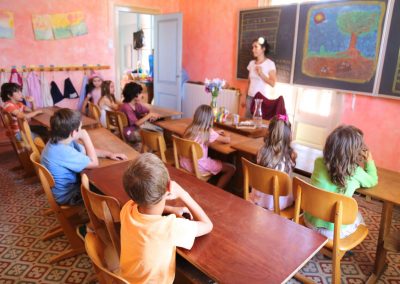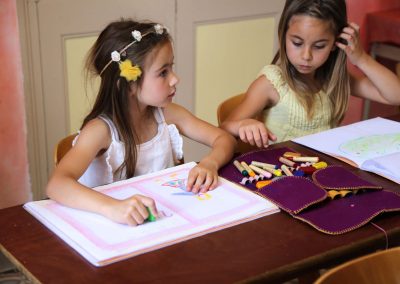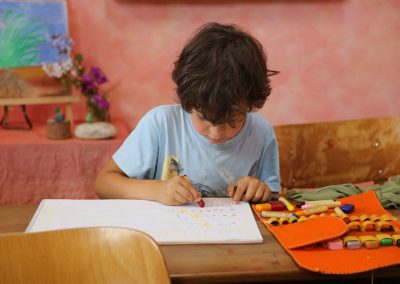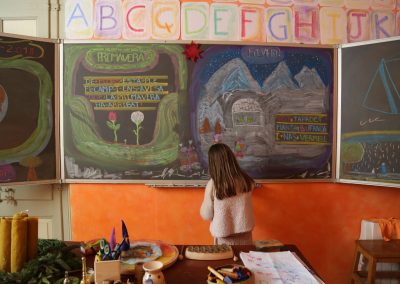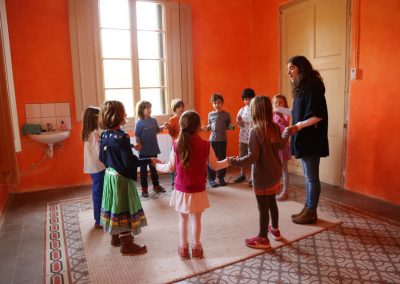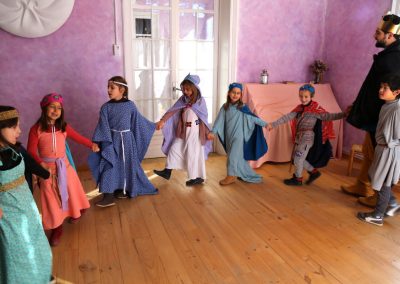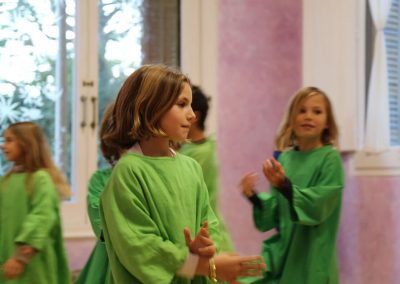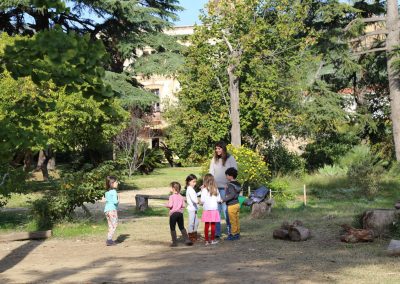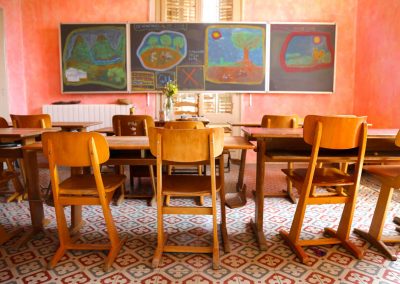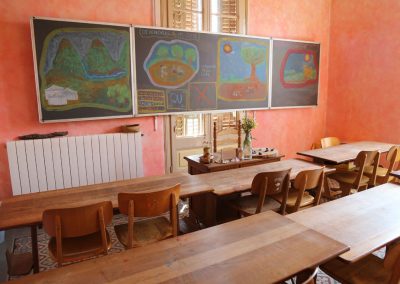WALDORF PEDAGOGY IN PRIMARY
The Krisol Waldorf-Steiner School develops its educational task in primary school taking into account these characteristic premises of pedagogy.
- The world is beautiful
Art and music are very important to involve the feelings of the child. Art arouses the interest of the child, the basis of their learning is the playful impulse, creation. All creative activities help children gain inner strength and learn to carry out their ideas. With art they develop social skills, listening, etc.
- The class teacher
The classroom teacher, ideally, accompanies and guides the entire primary school stage; That is why continuous training is necessary. This direct relationship with the group and with the families provides them with a deep knowledge and a strong bond, which allows them to develop a clear focus and the continuous work of observation. The teacher who develops an attitude worthy of imitation acts as a moral authority based on commitment. It is who develops the main class, the first two hours of the morning, and other subjects. Over the years, specialist teachers are incorporated: English, eurythmy, music, physical education, crafts …
- The main class
The subjects are given in blocks of several weeks for two hours each morning. The first part of the main class contains rhythmic activities (movement, recitation, expression …) and the second part is in the classroom working on the corresponding topic in a notebook. The main class comprises and addresses a varied and progressive range of skills, competences and faculties in language, mathematics, arts, sciences and humanities. Important transversal connections are made between the various thematic areas and among the themes of the main classes. The objective of the class teacher is to create an artistic combination for each class where the parts are related to the whole, and the whole is impregnated with rhythm, structure and meaning.
- The place of books
Teaching in a Waldorf school essentially comes “through” the teacher and not via textbooks. The teacher chooses the material and presentation to fit their particular group of children. The imaginative, oral and practical presentations of the class material, carefully prepared by the teacher, generate interest and accentuate the authority of the teacher in the eyes of the child. Children are the creators of their textbooks that they elaborate them with great dedication and care.
- The rhythm of learning
The school day and year are structured in an organic way that establishes a healthy balance of experience between concentration and relaxation, mental and practical work, movement and rest, listening and participation, looking and doing. Each class should contain a balance between activities for the child´s thinking, feeling and wanting. Each day has its own structured rhythm, just as each class. Rhythm allows repetition to occur with renewed interest. The annual rhythm is marked by the celebration of seasonal festivals and gives a balance in the school as a whole and a sense of continuity, while also helping to create an intense community experience.
- Phases of learning
After a period of concentration on a given topic (3 or 4 weeks), this topic is left aside and allowed to rest / sleep before it is brought back to consciousness, in a process of digestion, assimilation and growth. When the knowledge is settled, it can be evoked later and serves as a foundation on which to build. The nature of memory also undergoes metamorphosis, evolving from situational or local (routine) memory, to rhythmic (tables, poetry …), and finally to abstract. All knowledge must be immersed in a context that makes sense for the student.
- Attention instead of exams
The evaluation of learning throughout the main class program is a continuous process in which the teacher makes a detailed observation of each student, to understand and develop the skills and abilities of each child and to convey an image of learning and behavior in all fields. A daily record takes place in the child´s class notebook.
- The importance of narration
Narration gives children a conceptual framework within which they can guide and understand their experiences. Narration contains beginnings, development, and consequences or results. Listening to stories told by the teacher in their own words not only highlights language and listening skills, but also encourages a strong sense of identification. Children are told stories from a variety of sources, fairy and folk tales, legends, fables, parables, mythology, history, literature. The teaching content is also transmitted orally.
- Pictorial and imaginative language
The pictorial element comes before the abstract terminology. The imaginative concepts have the virtue of growing as the child is modifying their understanding of the world. Whenever possible, the teacher makes use of images when talking to children. The smallest children, until 8 or 9, require concrete images that evoke strong sensory impressions in the imagination. Children advance from an imaginative, imaged consciousness, to more abstract and intellectual thought processes. This transition takes place after 10, when the faculty of thinking begins to emerge.
- Values and the environment
The Waldorf pedagogy is impregnated with humanistic values. The class is a microcosm of the society that surrounds it, and the children learn to respect and understand different individual skills and weaknesses. The task of the teacher is to promote social awareness and cohesion within the class group, where the members listen and take care of each other. An education is cultivated towards freedom and preparation for life. It awakens interest in the world and for humanity, an admiration for nature, for the environment and for other people. Tools for building relationships with others are transmitted: respect, listening, cooperation, social consciousness. It builds self-confidence, experiencing effort and personal challenge with tailor-made work and encourages involvement, commitment, a sense of justice and responsibility.
- Discipline and rules of coexistence
In primary school, the rhythm, form, limits and authority of the teacher come together to create and inspire structure in the management of classroom life. Consciously offering space, the teacher offers freedom and stimulates a mood of positive discipline. Standards and codes of conduct are designed to promote care and respect for people and objects in the child’s environment. They are clear, transparent and understandable to teachers, parents and students, at a general level and in its details, as well as its consequences. When conflictive situations occur, they are treated case by case and remedial solutions are promoted.
- Families and teachers working together
Education needs the support and interest of families, and the children always benefit when this collaboration is mutually supportive. Teachers propose several trimesterly pedagogical meetings to present aspects of the child’s curriculum or evolution and individual interviews or family visits.
TEACHING FACULTY
Taking into account that the pioneer group of la Escuela Krisol Waldorf-Steiner in 2019-2020 is in the third year of Primary, the Primary School is composed of:
Rafael Gómez Ramírez: Third class teacher
Myriam Busquets Rams: Second class teacher
Marien Fernández Paredes: First class teacher
ESPECIALISTS:
María Romo: Eurythmy Teacher
Boglárka Ferenczy: English teacher
Pau Campderrós Estrada: Physical activities teacher
TIMETABLE
The school timetable is from 08.30 to 13.30 for first and second class and from 8.30 to 14.15 for third class and follow. The applicable school calendar is that of the Departament d’Ensenyament de la Generalitat de Catalunya, with the local holiday days of Premià de Dalt.
SERVICES
There is the possibility to eat a packed lunch at school and the afternoon service is also offered until 16:30. These services are paid separately from the monthly fee.
PRE-REGISTRATIONS AND ADMISSIONS FOR THE 2020-2021 ACADEMIC YEAR
There are places available in the 1st, 2nd, 3rd and 4th year of primary school.
Admission process:
- Individual interview with teachers: giving pedagogical information
- Interview with parents of the school: with associative information.
- Week / fortnight of trial period in a Primary class: to observe how the child adapts to the group, to the methodology, to classmates and to the teaching team. It can be done during the third term of this school year.

